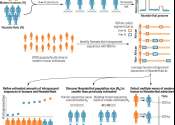Getting here from there: Mitochondrial genome clarifies North American migration models
(Phys.org) —It is generally agreed that the ancestors of modern Native Americans were Asian peoples who migrated to North America from Siberia and Beringia – a region proximate to the Bering Strait, Bering Sea and Chukchi ...









